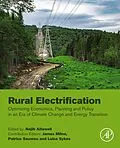Rural Electrification poses solutions to the insuperable modern challenge of providing 24/7 electricity for populations, housing and territory located outside towns and cities. The book reviews the historical development of rural energy systems, their status quo, and the role of renewable and fossil fueled solutions in delivering electricity. It addresses core issues of energy source typologies, resource deployment, fundamental challenges and limitations, the burgeoning threat of climate change, and the role of the renewable energy transition. Chapters account for almost all forms of fuel solutions, with a focus on electrification economics, planning, and policy using the most cost-effective fuels and systems available. Novel approaches to address the challenges of rural electrification, including distributed generation systems, new management and ownership models, off-grid systems, and future energy technologies are thoroughly explored. The work concludes with a comparative assessment of different energy supply technologies and scenarios, contrasting the pros and cons of fossil fuels versus renewable energy resources to achieve the goal of comprehensive rural electrification. - Provides a suite of new approaches to deliver and expand electrification across challenging rural environments - Describes optimal economics, planning and policy for electrification where there is no access to electricity - Reviews how practitioners can achieve cost reductions for rural energy supply using existing technologies - Addresses routes to power rural electrification within a transitioning energy economy while simultaneously accounting for climate change considerations
Autorentext
Najib Altawell is a consultant in renewable energy and fossil fuels, specialised in biomass commercial and technical aspects. He earned his PhD in environmental engineering from the University of Nottingham, MRes in Nanotechnology and Nanoelectronics from Surrey University, BSc (Hon) in Computer Science from Westminster University, and PGCT from Greenwich University and PGDHE from Plymouth University. He studied biomass materials, including energy crops, in relation to the technical, scientific and business aspects for power generating companies as well as for transportation and heating/cooling systems. Also, he designed a new type of bio-fuel (SFS) together with a new methodology for selecting the most suitable biomass materials for the purpose of co-firing and/or fuel production. In addition to the above, he has produced a new software program (REA1) to speed up the process of biomass materials selection.
Klappentext
Rural Electrification poses solutions to the insuperable modern challenge of providing 24/7 electricity for populations, housing and territory located outside towns and cities. The book reviews the historical development of rural energy systems, their status quo, and the role of renewable and fossil fueled solutions in delivering electricity. It addresses core issues of energy source typologies, resource deployment, fundamental challenges and limitations, the burgeoning threat of climate change, and the role of the renewable energy transition. Chapters account for almost all forms of fuel solutions, with a focus on electrification economics, planning, and policy using the most cost-effective fuels and systems available.
Novel approaches to address the challenges of rural electrification, including distributed generation systems, new management and ownership models, off-grid systems, and future energy technologies are thoroughly explored. The work concludes with a comparative assessment of different energy supply technologies and scenarios, contrasting the pros and cons of fossil fuels versus renewable energy resources to achieve the goal of comprehensive rural electrification.
- Provides a suite of new approaches to deliver and expand electrification across challenging rural environments
- Describes optimal economics, planning and policy for electrification where there is no access to electricity
- Reviews how practitioners can achieve cost reductions for rural energy supply using existing technologies
- Addresses routes to power rural electrification within a transitioning energy economy while simultaneously accounting for climate change considerations
Inhalt
1. Energy's General Introduction
2. Coal
3. Crude Oil
4. Natural Gas
5. Project Management in Oil and Gas
6. Distributed Generation Systems (DGS)
7. Off-Grid Systems Hardware
8. Rural Electrification Projects
9. Finance
10. Cooperative Model
11. Energy Economics
12. Energy Technologies and Energy Storage Systems
13. Field Visits
